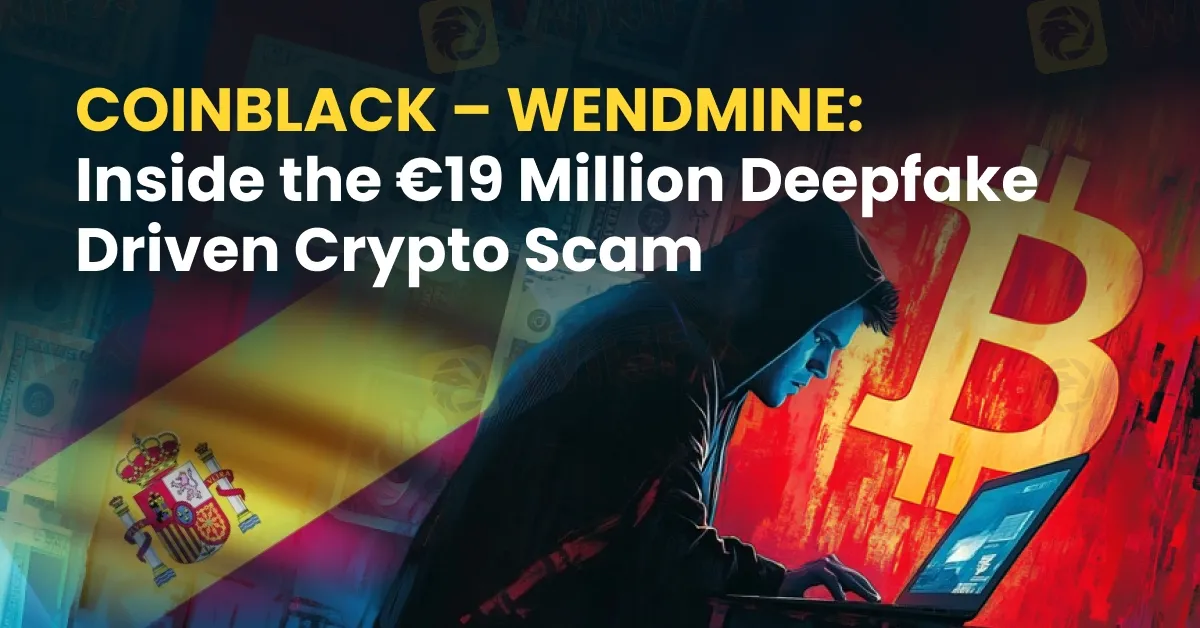COINBLACK – WENDMINE: Inside the €19 Million Deepfake Driven Crypto Scam
Abstract:Spanish authorities have dismantled a sophisticated international cryptocurrency scam known as COINBLACK - WENDMIND that defrauded victims out of €19 million, utilising artificial intelligence (AI) and deepfake technology to lend credibility to false investment platforms.

Spanish police have broken up a global cryptocurrency fraud operation known as COINBLACK – WENDMINE, which used artificial intelligence and deepfake videos to trick victims into investing in fake platforms. The scam stole €19 million from 208 people around the world.
The investigation began two years ago after one victim came forward. Police eventually arrested six suspects between the ages of 34 and 57 in the Spanish regions of Granada and Alicante.
Officers also seized €100,000 in cash, along with mobile phones, computers, hard drives, firearms, and documents. These items helped uncover how the criminals ran the scheme.
The group used AI tools to create deepfake videos that showed well-known national figures endorsing fake investment platforms. These videos made the offers seem more trustworthy and encouraged people to invest.
The scammers targeted victims by using algorithms to select people who matched certain personal or financial traits. They then approached these individuals by pretending to be financial advisors or even forming fake romantic relationships.

In the early stages, victims saw high returns on their investments. However, the platforms were fake, and the figures were invented to build false confidence. Eventually, the scammers told victims that their funds had been blocked. To get their money back, they were asked to make additional payments.
In the final stage of the scam, the criminals posed as Europol agents or UK lawyers. They claimed the victims' funds had been recovered, but said taxes or legal fees had to be paid before the money could be released.
Police also discovered that the group had set up many shell companies to move and hide the stolen money. The ringleader used over 50 fake identities to stay hidden.
Authorities are warning the public to stay alert. They advise people to be suspicious of any investment offering guaranteed returns. It is important to research platforms carefully and confirm their legitimacy before sending money.
Other warning signs include pressure to invest quickly, being unable to withdraw funds, and being asked to pay extra fees or taxes to access money. Officials also warn against trusting videos of celebrities or public figures that promote financial services, as these can now be easily faked using AI.

To prevent falling victim to fraudulent schemes like this one, using tools like WikiFX can be a game-changer. WikiFX provides detailed information on brokers, including regulatory status, customer reviews, and safety ratings, allowing users to verify the legitimacy of any investment platform before committing their money. With access to in-depth insights and risk alerts, WikiFX equips potential investors with the resources to make informed decisions and avoid unauthorised or unlicensed entities. By checking with WikiFX, users can confidently protect their savings and avoid the costly traps set by unscrupulous investment syndicates.

Read more

Judge Reviews Sanctions Against CFTC in My Forex Funds Fraud Case
A New Jersey judge reviews sanctions against the CFTC after a special master accused the agency of bad faith in its fraud case against My Forex Funds and CEO Kazmi.

RM80 Million in Losses After ‘Islamic’ Scheme Falls Apart
A group of 232 investors is urging Malaysian authorities to launch a comprehensive investigation into an Islamic investment scheme that reportedly incurred losses exceeding RM80 million. The scheme, marketed under the guise of Islamic Redeemable Preference Shares (IRPS), is now under scrutiny for alleged misrepresentation and regulatory breaches.

PJT Academy Scam: RM459,000 Lost to a Fake Trading Group
A 73-year-old retiree in Johor Bahru lost RM459,000 to an online investment scam operated by a group calling itself PJT Academy. The group claimed to teach members how to trade stocks using an app called 'USMSG', promising returns of up to 200%.

BitGo Secures MiCA License, Expands Crypto Services Across the EU
BitGo Europe GmbH has received a MiCA license from BaFin, enabling the firm to offer regulated digital asset services across the European Union, boosting crypto adoption.
WikiFX Broker
Latest News
Short-Term Pressure Mounts on Gold as Risk Sentiment Improves
Radiant DAO Proposes Compensation Plan for Wallet Losses
How Will the U.S.-China Trade Deal Affect the Dollar and Global Markets?
BitGo Secures MiCA License, Expands Crypto Services Across the EU
Big Changes at Saxo Bank: What Traders and Partners Need to Know
Traders Warned to Stay Alert Amid Growing Exposures for INGOT Brokers
WELTRADE's transformation from Reliable to a Problematic Broker
WikiFX “Elite’s View on the Challenge: Dialogue with Global Investment Leaders” Concludes Successful
Plus500 Review 2025: Trusted CFD Broker with Top Features Unveiled
How UK-China Financial Cooperation Is Shaping Global Resilience
Rate Calc
